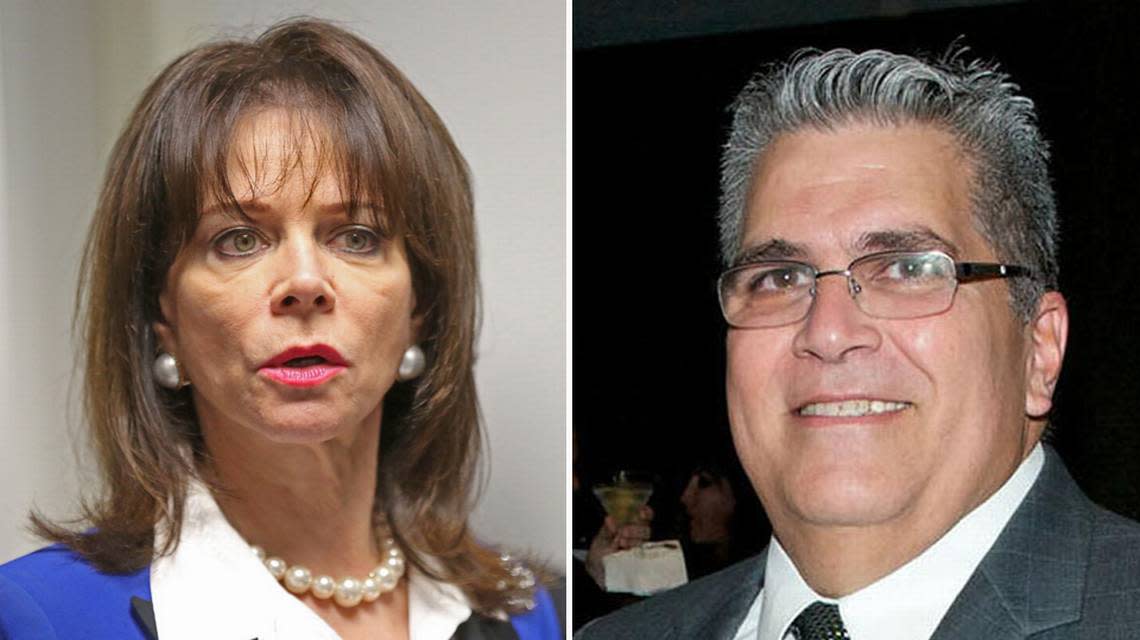Judge: Miami-Dade public defenders did not witness tamper, can remain on murder case

A judge has denied a request by state prosecutors to remove two assistant public defenders from a 2020 murder case for alleged witness tampering. But a criminal investigation into the alleged incident by defense attorneys remains active, the state insisted Monday.
Miami-Dade Assistant State Attorney Shawn Abuhoff argued in his motion that the attorneys defending accused murderer Jamal Marcus Pratt hired a private investigator who tried to rattle the state’s key witness by impersonating a police officer. The investigator allegedly showed neighbors of the witness a recent mugshot and called her a “rat” as a public defender overheard the conversation on a cellphone.
Pratt, 37, is accused of shooting a Liberty City man three times and killing him as he ran into a convenience story after a fight escalated to gunfire during an altercation four years ago.
Late Friday, Miami-Dade Circuit Court Judge Andrea Wolfson denied the state’s motion in a brief statement, saying that assistant public defenders Lauren Dawson and Natalie Ender “conducted a thorough colloquy of the defendant who waived all potential conflicts...”
The prosecutor’s motion prompted a statement from the Florida Association of Criminal Defense Lawyers. They’ve been leading a bitter back-and-forth with state prosecutors over alleged prosecutorial misconduct that began in March when Wolfson removed lead state prosecutor Michael Von Zamft from the re-sentencing of gangster and convicted killer Corey Smith.
On Monday, the association’s board of directors said the Miami-Dade State Attorney’s Office “continues to engage in a pattern of unethical misconduct” in cases in which defense attorneys have “... done nothing more than uphold their constitutional obligation and duty to defend their client.”
“The unjustified decision to publicly accuse these lawyers and their investigator of a crime highlights the inability of the State Attorney’s Office to learn from its past mistakes and to prosecute their cases in an ethical manner,” the board wrote.
The decision by Abuhoff and his office to move forward with the witness-tampering claim and ask for the removal of Ender and Dawson came after a failed bid last month by the public defenders to remove Abuhoff from Pratt’s murder trial.
Focus on key witness
The defense attorneys took issue with Abuhoff and a police officer showing up and banging on a car window as a private investigator working with the defense team talked to a key witness in the Pratt case just outside her Liberty City apartment. Wolfson quickly tossed that request, as well.
The accusations in the Pratt case are an extension of complaints filed by defense attorneys since the Smith ruling. Not long after, the defense attorneys’ association put together a binder of instances it perceives to be prosecutorial misconduct by the state attorney’s office dating back a decade, then met with State Attorney Katherine Fernandez Rundle, demanding reform.
Included in the grouping is the murder trial of OnlyFans model Courtney Clenney and the prosecution of two former Hialeah police officers charged with kidnapping and beating a well-known homeless man. In a recent ruling, Miami-Dade Circuit Court Judge Laura Shearon Cruz tossed evidence gathered by prosecutors in a case involving computer hacking against Clenney and her parents.
The judge said prosecutors strayed from the established legal principle of attorney/client privilege when they recovered electronic communication between Clenney and her parents in the murder case of Clenney’s boyfriend Christian Obumsemli. The OnlyFans model is accused of stabbing him to death in their bayside Miami apartment in 2022.
READ MORE: In major blow to OnlyFans model computer hacking case, judge tosses state’s evidence
The family was able to recover his computer from the couple’s apartment after police overlooked it during their gathering of evidence. They tried to breach it in search of information that could help in their client’s defense.
After the judge’s ruling, the state dropped the hacking charges against the Clenneys. That led to defense attorneys questioning whether prosecutor Khalil Quinan should remain on the case.
After Judge Wolfson’s recent ruling, the state maintained Dawson and Ender continued to be investigated for possible criminal misconduct — but no longer by its office. On Friday, Deputy Assistant State Attorney Christine Zahralban forwarded emails to prosecutors saying the duo were under “criminal investigation” by the office, though no decision had been made about charges. The email warned prosecutors to inform defendants of the situation and any possible conflict.
Monday, without explanation, state attorney spokesman Ed Griffith said the investigation had been handed off to the Florida Department of Law Enforcement. The state agency had not responded to questions or confirmed an investigation by just before noon.

